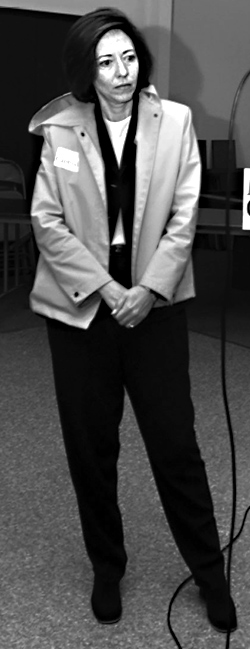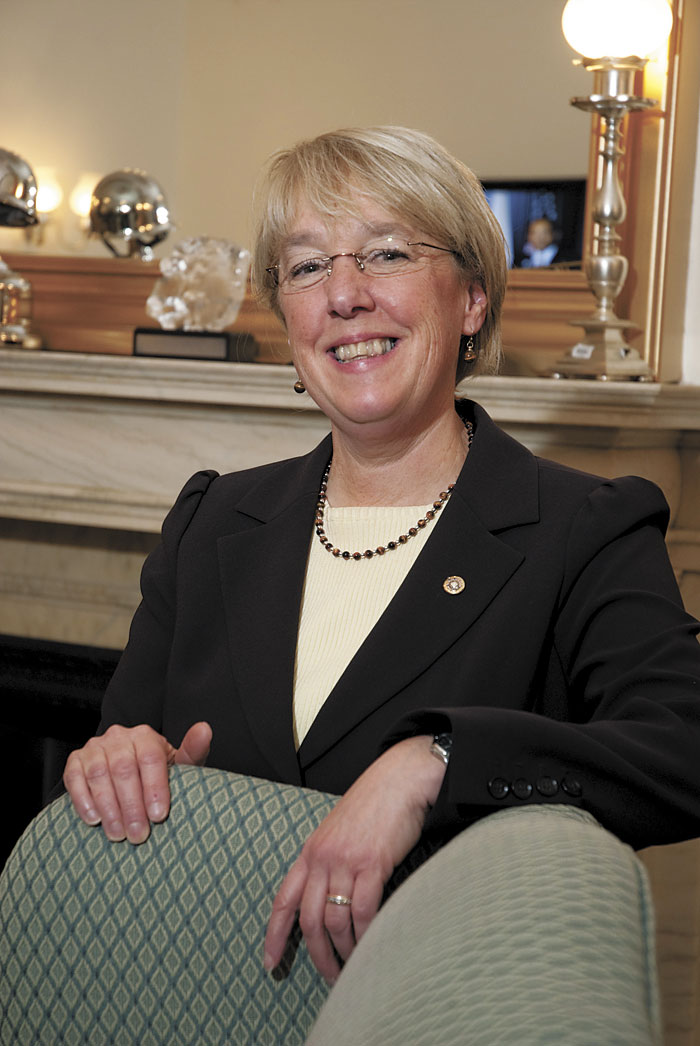During one winter visit to Central Washington, Sen. Maria Cantwell and an aide found themselves at a diner in Vantage, a small town on the banks of the Columbia River Gorge. It was one of those quirky, spot-in-the-road joints, its interior lined with Polaroids of patrons doing splits, ballerina-style: one leg on the ground, one leg on the wall.
Cantwell was inspired. “I can do that!” she exclaimed, and pitched her leg up.
It wasn’t a media stunt or a clever way to charm small-town Washington, says Charla Neuman, who until recently was Cantwell’s Washington, D.C.–based press secretary. In fact, says Neuman, most folks there thought she and Cantwell were just another couple of tourists passing through.
So why the spontaneous goofiness? “Maria is Maria,” Neuman says. “She can be light.”
The lighter side of Sen. Cantwell is something few on her staff ever get to see. Yet some who were once in her inner circle say that her boss-from-hell reputation is unfair; that they had great experiences working for Cantwell; that she’s smart and driven.
But as she begins her second term as the state’s junior senator, one wonders how long Cantwell’s newly hired legislative director, 27-year-old Harvard Law grad Courtney Gregoire, daughter of Gov. Christine, will last (she’s the fifth legislative director in six years)—and whether Cantwell’s reputation for being hell on wheels will truly become a thing of the past.
There are a lot of big personalities and unreasonable expectations on Capitol Hill (the D.C. version). Much like any foreign land, the Hill has its own language, its own hierarchy, and its own peculiar customs. One tradition is that staff, though loyal to their offices, also take care of their own—which means sharing experiences and cautioning others about legislators who are unpleasant to work for.
Cantwell’s office is one that newcomers to the Hill are often warned about. I received this memo a few years ago while sniffing around for an office to spend an eight-month fellowship. In the end, I accepted a position in the office of Oregon Sen. Ron Wyden, but the warning was something that I heard in passing more than once during more than two years as a fellow and journalist on the Hill.
Of the dozen or so former Cantwell staffers interviewed for this article, half were reluctant to publicly discuss their experience. Another half-dozen declined to be interviewed on any condition. Privately, though, some former staffers speak of Cantwell’s tendency to be a ruthless taskmaster, of being glad when they weren’t on the receiving end of one of her tirades, and of a lack of stability and direction in the office that ultimately contributed to their decisions to leave.
“You hear about her reputation of being focused and a taskmaster,” says one former staffer who spoke on condition of anonymity. “As with any elected official, it’s demanding. There are a lot of eyes on you. You spend your first term trying to find your place.
“Maria Cantwell wanted to make an impact,” the staffer continues. “She’s not there to make her staff happy. She doesn’t say ‘thank you’ as often as she should. She says we’re all adults: Let’s get it done. But a little pat on the back goes a long way.”
Says Jason Bennett, who worked as Cantwell’s state outreach director for a little over a year: “She has two reputations that precede her. One is that she’s hard to work for. Some people connect with her work ethic, and some people don’t. The other is that she does things differently. The hierarchy in her office is flat.” While this management structure matched his experience, Bennett says Cantwell wasn’t a bad boss. “I had a good time working for her. I think we approached things the same,” he says.
Bennett, now president of Seattle political consulting firm Argo Strategies, says turnover depends on where you look. He points out that Cantwell’s state offices have been stable. “They haven’t budged,” he says.
In addition to losing her legislative director, Jennifer Griffith, who took a staff position on the Senate Rules Committee, Cantwell recently lost a press secretary and a legislative assistant who focused on energy issues. The energy policy aide also took a plum committee post, part of the spoils of a Democratic victory. Gregoire, who started earlier this month, is Cantwell’s fifth legislative director since she took office in 2001. Second only to the chief of staff—Cantwell’s had two since first being elected—the legislative director is in charge of directing and organizing policy initiatives.
According to the D.C.-based Congressional Management Foundation, the average tenure in the Senate is just under three years for a staffer holding one job in one office. While turnover on the Hill comes with the territory, the foundation’s executive director, Beverly Bell, says it’s hard for an office to achieve its goals if there isn’t stability at the highest levels.
“Obviously you need some leadership and some continuity for the staff to be able to work together as a team,” says Bell. She adds that an ongoing exodus of legislative directors is not a good sign. “If I were job hunting and saw an office that had five LDs in six years, I would have some questions. It certainly would be hard for a member to get much done.”
But some former staffers downplay Cantwell’s difficulty keeping people in this key position. They argue that Griffith, her most recent LD, served in that post for two years, but worked in the office for six. Yet while Bell says it helps for a new legislative director to have had tenure in the office, it doesn’t change the fact that the position has been in flux. “You’ve got these openings because someone’s moving out,” she says. “They’re not just playing musical chairs.”
Mary Frances Repko, who worked as Cantwell’s legislative director between December 2004 and April 2005, says there was a “culture of concern” about Cantwell’s freak-outs and the lack of acknowledgment of the staff’s hard work when she arrived. But she notes that Hill offices typically aren’t very nurturing places. Cantwell doesn’t really ask people to do things that she’s not doing, Repko says. “When you’re up till 2 in the morning,” says Repko, “[Cantwell] is up, too.”
Another complaint often heard from former staffers is Cantwell’s habit of waiting until the last minute before making decisions—about anything.
“The difficult thing was her desire to keep her options open, be it a vote or an event. She didn’t commit to anything until the last minute,” says one former staffer who spoke on the condition on anonymity. “It’s frustrating to work for her because of last-minute changes to her schedule, but she gets the media. She isn’t going to do something if it doesn’t get her anything.” This trait was on display just last month when Cantwell abruptly called off a Sunday tour of Burlington Northern’s downtown Seattle rail tunnel, an event that was supposed to highlight the need for security upgrades. (A notice canceling the event went out to reporters Saturday afternoon.)
Angela Becker-Dippman, who left Cantwell’s office in January after working on energy issues for six years, agrees that the senator likes to review all her options when planning an event. But she says Cantwell’s reputation for being difficult to work for is “drastically overblown.”
“There’s a difference between being highly motivated, intense, and having a strong work ethic, and being unfair,” says Becker-Dippman. “Is she tough? Yeah. But she’s never been unfair. On a personal level, she was always very good to me.”
Some former staffers describe Cantwell’s communication style as “Socratic” and probing. Larry West, who worked for Cantwell in both the House and Senate, says, “You want to make sure you walk into the office prepared.
“Part of her style is to question people,” he adds. “To some that can feel like interrogation, but I always understood it as a process by which she got to the truth. Sometimes it could be a little uncomfortable. There are people who are not prepared to play at that level.”
Neuman, the former press secretary, says those who stuck around were able to effectively communicate with Cantwell. “People’s biggest problems were not being real with her,” says Neuman, adding that as soon as people were direct it broke the tension. Neuman left Cantwell’s office in January to become the vice president of communications at Strategies 360, a public-affairs firm founded by longtime Cantwell associate Ron Dotzauer.
Neuman says she’d “heard the stories” and was worried about Cantwell’s reputation before she went to work for her; yet she says her experience was that problems existed not between staff and senator but with the gatekeepers between them, as it’s common for the chief of staff and legislative director to act as conduits.
“I think a lot was lost in translation,” Neuman says, but she notes that the hierarchy has flattened out. “I had the benefit of spending so much time with her. It’s tough to know a person when you’re back and forth between 15-minute meetings.”
The promise of a second term, newly acquired control of Congress (last week Cantwell moved from No. 99 in Congress.org‘s fall 2006 list of power rankings to No. 36, largely due to the Democratic takeover), and a new legislative director means an opportunity to soften the senator’s hard-ass reputation. And a lot of eyes will be on Gregoire, who was not available to be interviewed because of an office rule against letting staff talk with reporters on the record. Cantwell’s communications director, Katharine Lister, also declined to comment for this story.
But former Cantwell staffers who were willing to talk are pulling for young Gregoire. Caroline Fredrickson, Cantwell’s former chief of staff who worked with the governor’s daughter during her stint as a policy aide in the office, describes Gregoire as a “duck in water” on the Hill. “She’s one of those people you’d recognize as a natural talent,” adds Fredrickson.
Repko, a former Cantwell LD who hails from Michigan, says Gregoire’s native knowledge of Washington state will give her an advantage from the start. But while Gregoire has some Hill experience, at 27, she’s more than a decade younger than the average Senate LD, according to a 2001 Congressional Management Foundation survey.
But age shouldn’t be an issue, says Repko: “Being an LD isn’t about how old you are,” she says. “A legislative director is there to see that issues across staff are consistent. That doesn’t take age; it takes the ability to be a broader perspective taker.”






